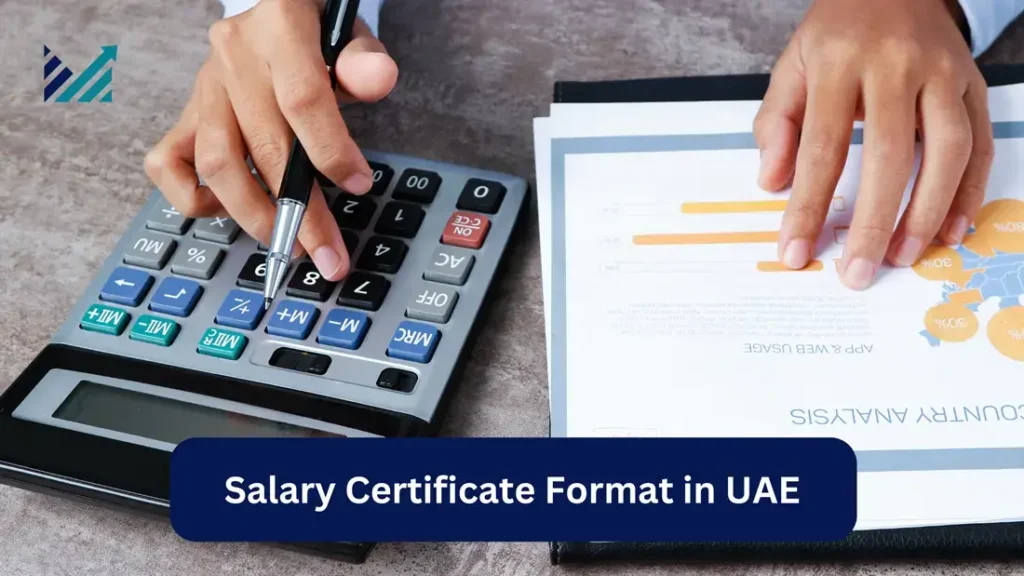
When you’re living and working in UAE, you may be required to provide proof of your income for different personal, financial, or legal purposes. One of the most commonly requested documents for this is a Salary Certificate.
In this guide, you’ll learn everything you need to know about a salary certificate in UAE: what it is, salary certificate format, how it differs from a payslip, its importance, what it includes, how to request one, how to get it attested, and what mistakes to avoid.
What is a Salary Certificate?
A salary certificate is an official document issued by your employer, confirming your current employment and salary details. It typically includes your name, designation, joining date, basic salary, allowances, and total salary, and is usually printed on the company’s letterhead and signed/stamped by the authorized person.
It is often required when:
- Applying for a loan or credit card
- Renting property
- Applying for a visa (especially family sponsorship)
- Opening a bank account
- Submitting official documents to government bodies
Salary Certificate vs Salary Slip – What’s the Difference?
| Salary Certificate | Salary Slip |
| Official letter from employer with overall salary details | Monthly statement showing earnings and deductions |
| Used for loans, visa, rentals, etc. | Used for internal record or financial tracking |
| Contains total salary, designation, joining date | Contains gross salary, deductions, and net salary |
| Formal and requested upon need | Given automatically every month |
In short: A salary certificate is more official and versatile, while a salary slip is more specific and limited to payroll information.
Why Is a Salary Certificate Important in UAE?
A salary certificate is important because:
- Banks require it to check your income before approving loans or credit cards.
- Landlords request it to ensure you can afford rent.
- Visa authorities need it to verify your eligibility for family sponsorship.
- Government bodies may require it for various public services or legal matters.
For expatriates, it also acts as proof of financial credibility and legal employment.
Key Elements of a UAE Salary Certificate
A standard salary certificate in the UAE should include:
- Employee’s full name
- Designation/job title
- Date of joining
- Basic salary
- Allowances (housing, transport, etc.)
- Total monthly salary
- Employer’s name, address, and contact info
- Date of issuance
- Authorized signature and company stamp
- Purpose of the certificate (optional but recommended)
Sample Salary Certificate Format – UAE Template
Here’s a sample format you can follow:
[Company Letterhead with Logo]
Salary Certificate
Date: [DD/MM/YYYY]
To Whom It May Concern,
This is to certify that Mr./Ms. [Employee Full Name], currently working as [Designation], has been employed with [Company Name] since [Date of Joining].
The employee’s monthly salary breakdown is as follows:
- Basic Salary: AED [Amount]
- Housing Allowance: AED [Amount]
- Transport Allowance: AED [Amount]
- Other Allowances: AED [Amount]
- Total Salary: AED [Total Amount]
This certificate has been issued upon the employee’s request for the purpose of [state purpose, e.g., visa processing, loan application].
For further verification, please feel free to contact us.
Sincerely,
[Authorized Signatory Name]
[Designation]
[Signature]
[Company Stamp]
How to Request a Salary Certificate in UAE
Follow these simple steps:
- Identify the Purpose
Know why you need the certificate (loan, visa, etc.) so the correct format is issued. - Contact HR or Admin Department
Request via email, portal, or by visiting HR depending on your company’s policy. - Provide Required Information
Share your full name, employee ID, and the specific purpose of the certificate. - Submit a Formal Request
If required, write a polite letter/email requesting the salary certificate. - Follow Up if Needed
Normally, certificates are issued within 1–3 working days.
Is Attestation Required for Salary Certificate in UAE?
Yes, especially if you are using it for official purposes, like:
- Visa applications
- Loan approvals
- Submission to foreign embassies or government departments
Attestation proves the document’s authenticity and legality.
How to Get Your Salary Certificate Attested (Step-by-Step)
- Get the certificate from your employer
- Visit the Ministry of Foreign Affairs (MoFA) or authorized service centers
- Submit the document and pay the attestation fee (online or in person)
- Collect the attested certificate once processed
Tip: For international use, MoFA attestation is often mandatory.
Legal Rights of Employees
Under UAE Labour Law (Federal Decree-Law No. 33 of 2021), you have the right to request a salary certificate. Your employer cannot refuse unless there is a legal reason. If your request is denied:
- You can file a complaint with the Ministry of Human Resources and Emiratisation (MOHRE)
Common Mistakes to Avoid
- Wrong or missing salary details
- No official stamp or signature
- Incorrect purpose mentioned
- Using outdated certificate (always use the latest one)
- Submitting an unsigned or unstamped certificate
Salary Certificate Format in UAE FAQs
1. Can my employer refuse to give me a salary certificate?
No. If you are currently employed, your employer is legally required to issue it upon request.
2. How long is a salary certificate valid in the UAE?
Usually valid for 30 days, but some institutions may accept it up to 90 days.
3. Can it be written in Arabic?
Yes. It can be issued in Arabic or English, depending on the receiving authority’s requirements.
4. Is there a fee for a salary certificate?
Most companies provide it for free. If not, it should be clearly mentioned in the company policy.
5. What is a stamped salary certificate?
It’s a salary certificate that includes your employer’s official stamp to validate the document.
6. What is a salary transfer certificate in the UAE?
This is a different document confirming that your salary is transferred to a specific bank account—often requested by banks for personal loans or credit cards.
7.Why Do Banks in the UAE Request a Salary Certificate?
Banks in the UAE request a salary certificate to verify your employment details and monthly income. This helps them assess your financial stability and repayment capacity when applying for services such as personal loans, credit cards, or car financing.
8. How Long Does It Take to Obtain a Salary Certificate in the UAE?
Generally, it takes 1 to 3 working days to receive a salary certificate, depending on your company’s HR policies and procedures. Some companies may provide it on the same day upon request.
9. Can I Get a Salary Certificate Online in the UAE?
Yes, many employers in the UAE offer digital HR services where you can request and download a salary certificate through their internal portals. Some free zones and government entities also provide online options.
10. How Can I Check My Salary in the UAE?
You can check your salary in the UAE through the following methods:
- Bank Statement: Monitor salary deposits via online or mobile banking.
- Wage Protection System (WPS): If you’re paid through WPS, the Ministry of Human Resources and Emiratisation (MOHRE) can confirm salary details.
- Company Payslip: Check monthly payslips issued by your employer.
- MOHRE App or Website: You can also check your employment contract and salary details through the official MOHRE platform.
Final Thoughts
A salary certificate in the UAE is a critical document that can help you access banking, housing, visa, and government services. Whether you’re an employee requesting one or an employer issuing it, understanding the correct format, purpose, and legal obligations ensures the process is smooth and error-free.
Also Read: Tax Advantages in UAE

